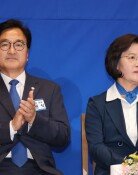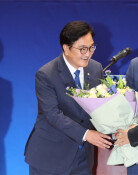No More Annual Shipments of 500,000 Tons of Fuel Oil to North
No More Annual Shipments of 500,000 Tons of Fuel Oil to North
Posted October. 20, 2002 22:41,
The New York Times, citing Bush administration`s senior officials, reported on Oct. 19th that the Bush administration has decided to scrap the 1994 arms control accord with North Korea that has provided Western energy aid in return for the North`s promise to freeze the development of nuclear weapons.
Consequently, the crisis triggered by North Korea`s admission of its nuclear weapons program is building up, and the North-US relations is also expected to be strained and affected in all respects.
According to it, other officials described a lengthy debate within the White House over the risks of abandoning the agreement altogether. Mr. Bush, who came to office deeply suspicious of the usefulness of the accord, has concluded that the North Korean admission, made in defiant tones after the United States presented evidence of the breach, proves that the accord was fatally flawed all along
"We think the framework as we knew it is dead," one senior administration official said when questioned about the administration`s strategy. "The North Koreans already told us they viewed it as `nullified,` " the official added.
The immediate practical effect of the decision to scrap the agreement is the halting of the annual shipments of 500,000 tons of fuel oil from the United States to North Korea. The United States will urge, The New York Time reported, its allies, Japan and South Korea, to suspend, if not end, a multibillion dollar project to provide modern nuclear power plants to the North.
"There are some who fear that it could tempt the North Koreans into a rapid breakout, to produce weapons as fast as they can," one official involved in the debate said. But the United States will warn North Korea that it should not remove any of that material from the storage facilities, which the International Atomic Energy Agency monitors.
With regard to North Korea`s nuclear program, The Yomiwoori reported on Oct. 19th that the Japanese government has begun to review ways to freeze its light-water reactor program. Japan plans to confirm the existence of the nuclear program during the talks for normalization with North, which is scheduled for Oct. 29th in Malaysia. Then, after close consultation with South and the United States, will determine whether it should halt the light-water reactor program.
In the meanwhile, Chinese government officials confirmed that Assistant Secretary James Kelly and Chinese senior officials agreed to solve the matter through diplomatic efforts and peaceful means.
On the other hand, South Korean government denied the report of The New York Times that the United States would withdraw from the arms control accord.
Shim Yoon-cho, Foreign Ministry`s official in charge of the Northern American region, told on Oct. 20th, "The official reaction of US government as to the 1994 arms control accord, as revealed by Mr. Kelly, is not yet determined."
He also commented, "The Bush administration officially informed us that it would solve North`s problem in consultation with US Congress, South Korea and Japan." He continued, "What The New York Times reported does not represent the official position of the US government. It`s just based on personal opinions of some administration officials."
He added, "For US, it is natural to consider those options, since North Korea`s development of a nuclear program itself runs direct counter to the 1994 arms control accord." He stressed, "But the US has to discuss the issue with KEDO member nations and consider North`s response in making determination. Thus, for now, it is early to say that US has officially withdraw from the accord."
Ki-Heung Han eligius@donga.com







